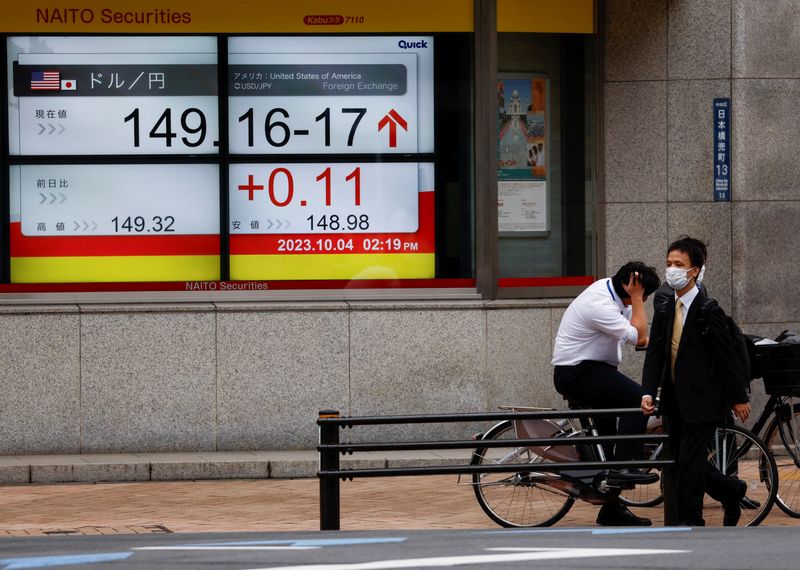By Caroline Valetkevitch
NEW YORK (Reuters) -Global stock indexes mostly rose while the U.S. dollar dipped to a near five-month low on Friday ahead of the long holiday weekend, with cooler-than-expected U.S. inflation data supporting the view that the Federal Reserve could cut borrowing costs in the new year.
The Commerce Department report showed U.S. prices fell in November for the first in more than 3-1/2 years, pushing the annual increase in inflation further below 3%.
The data is the last major release this year, and many investors are expected to be away between Monday's Christmas Day holiday and New Year's Day.
Stock investors have cheered recent signs from the Fed on the outlook for rates. At the conclusion of its policy meeting on Dec. 13, the Fed signaled that it had reached the end of its tightening cycle and opened the door to interest rate cuts in the coming year.
The U.S. benchmark S&P 500 is inching closer to its all-time closing high. Reaching a new closing high would have confirmed the benchmark index had been in a bull market since closing at the bear market floor in October 2022.
"The data was very dovish, and, of course, this is the Fed's primary measure of inflation. But the core being below expectations and the top line also being below expectations is positive for the market, indicative that inflation is declining," said Tim Griskey, senior portfolio strategist at Ingalls & Snyder in New York.
"It's more evidence that this is a good environment for investing."
The Dow Jones Industrial Average fell 18.38 points, or 0.05%, to 37,385.97, the S&P 500 gained 7.88 points, or 0.17%, to 4,754.63 and the Nasdaq Composite added 29.11 points, or 0.19%, to 14,992.97.
All three indexes moved closer to flat as the session progressed after an initial rally, but the S&P 500 is now within 1% of its record close reached in January 2022.
The three major U.S. stock indexes also registered an eighth straight week of gains. It was the S&P 500's longest weekly winning streak since late 2017, while the Nasdaq and Dow marked their longest streaks of weekly gains since early 2019.
"The consensus is we're going to have rate cuts ... in March. I think that's maybe too optimistic. To me, you're borrowing against 2024 gains a little bit with this rally," said Alan Lancz, president of Alan B. Lancz & Associates Inc., an investment advisory firm, based in Toledo, Ohio.
The U.S. market will be closed Monday for the Christmas holiday.
The pan-European STOXX 600 index rose 0.14% and MSCI's gauge of stocks across the globe gained 0.14%. The MSCI index also notched an eighth straight week of weeks.
{{2126|The dodollar index was last down 0.08% at 101.7, after dipping as low as 101.42, its lowest since late July.
The index is on pace to finish the year down about 2%.
On Friday, the dollar also weakened to a near nine-year low against the Swiss franc and was last down 0.02%.
Benchmark 10-year Treasury yields ended slightly higher on the day, with traders closing positions ahead of the long weekend.
Benchmark 10-year yields ended up less than a basis point at 3.897%. Two-year yields fell 2 basis points to 4.325%.
In the energy market, oil prices eased amid expectations that Angola could increase output after leaving OPEC.
U.S. crude oil fell 33 cents to settle at $73.56 per barrel, while Brent dipped 32 cents to $79.07.

Spot gold added 0.4% to $2,052.98 an ounce.
In cryptocurrencies, bitcoin slipped 0.34 % to $43,726, just shy of the eight-month high of $44,729 hit earlier this month..
